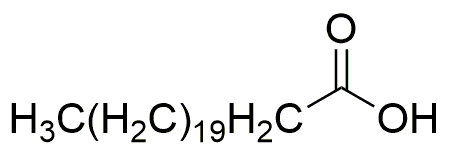Behenic acid is widely utilized in research focused on:
- Cosmetic Formulations: This fatty acid is commonly used in skin care products for its emollient properties, helping to soften and smooth the skin. Its ability to enhance the texture of creams and lotions makes it a preferred ingredient in high-end cosmetics.
- Food Industry: Behenic acid serves as a food additive and emulsifier, improving the stability and texture of various food products. It can help in creating smooth sauces and dressings, enhancing the overall mouthfeel.
- Pharmaceuticals: In the pharmaceutical sector, it is used as a lubricant in tablet formulations, ensuring smooth production and aiding in the release of active ingredients, which can enhance the bioavailability of medications.
- Biodegradable Plastics: Behenic acid is utilized in the production of biodegradable polymers, contributing to environmentally friendly packaging solutions. This application addresses the growing demand for sustainable materials in various industries.
- Industrial Lubricants: Its properties make it suitable for formulating high-performance lubricants, which are essential in reducing friction and wear in machinery, thus extending equipment life and improving efficiency.
General Information
Properties
Safety and Regulations
Applications
Behenic acid is widely utilized in research focused on:
- Cosmetic Formulations: This fatty acid is commonly used in skin care products for its emollient properties, helping to soften and smooth the skin. Its ability to enhance the texture of creams and lotions makes it a preferred ingredient in high-end cosmetics.
- Food Industry: Behenic acid serves as a food additive and emulsifier, improving the stability and texture of various food products. It can help in creating smooth sauces and dressings, enhancing the overall mouthfeel.
- Pharmaceuticals: In the pharmaceutical sector, it is used as a lubricant in tablet formulations, ensuring smooth production and aiding in the release of active ingredients, which can enhance the bioavailability of medications.
- Biodegradable Plastics: Behenic acid is utilized in the production of biodegradable polymers, contributing to environmentally friendly packaging solutions. This application addresses the growing demand for sustainable materials in various industries.
- Industrial Lubricants: Its properties make it suitable for formulating high-performance lubricants, which are essential in reducing friction and wear in machinery, thus extending equipment life and improving efficiency.
Documents
Safety Data Sheets (SDS)
The SDS provides comprehensive safety information on handling, storage, and disposal of the product.
Product Specification (PS)
The PS provides a comprehensive breakdown of the product’s properties, including chemical composition, physical state, purity, and storage requirements. It also details acceptable quality ranges and the product's intended applications.
Certificates of Analysis (COA)
Search for Certificates of Analysis (COA) by entering the products Lot Number. Lot and Batch Numbers can be found on a product’s label following the words ‘Lot’ or ‘Batch’.
Numéro de catalogue
Numéro de lot/série
Certificates Of Origin (COO)
This COO confirms the country where the product was manufactured, and also details the materials and components used in it and whether it is derived from natural, synthetic, or other specific sources. This certificate may be required for customs, trade, and regulatory compliance.
Numéro de catalogue
Numéro de lot/série
Safety Data Sheets (SDS)
The SDS provides comprehensive safety information on handling, storage, and disposal of the product.
DownloadProduct Specification (PS)
The PS provides a comprehensive breakdown of the product’s properties, including chemical composition, physical state, purity, and storage requirements. It also details acceptable quality ranges and the product's intended applications.
DownloadCertificates of Analysis (COA)
Search for Certificates of Analysis (COA) by entering the products Lot Number. Lot and Batch Numbers can be found on a product’s label following the words ‘Lot’ or ‘Batch’.
Numéro de catalogue
Numéro de lot/série
Certificates Of Origin (COO)
This COO confirms the country where the product was manufactured, and also details the materials and components used in it and whether it is derived from natural, synthetic, or other specific sources. This certificate may be required for customs, trade, and regulatory compliance.

